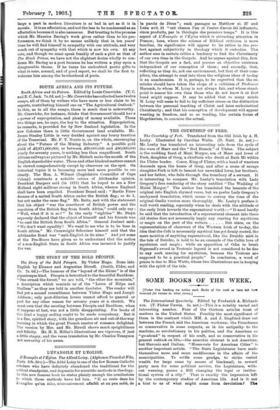LleVA.NGILE ET L'gGLISE.
IlEvangile et Par AHred Loisy. (Alphonse Picard et File, Paris. 3 fr. 50 c.)—The Abbe Loisy is one of the few Roman Catholic scholars who have definitely abandoned the traditional for the critical standpoint, and dogmatic for scientific methods in theology. In this now famous book he states plainly enough the conclusions to which those methods have led him. "Ii no rests dans lee E rangiles qu'un echo, necessairement affaibli et an pen melt, de la parole de Jesus"; such passages as Matthew xi. 27 and Luke xvii. 21 "out chance run et rautre d'avoir étd influences, sinon produits, par la theologie des premiers temps." It is this aspect of L'Evangile et l'Eglise which is attracting attention in France; here, where the science of Biblical criticism is more familial., its significance will appear to lie rather in the pro- test against subjectivity in theology which it embodies. The author sees in certain critics a tendency to find the Christianity of our own time in the Gospels. And he argues against this, first that the Gospels are a fact, and possess an objective existenct independent of our conception of them ; and secondly, that, reflecting as they do, not our environment, but that of their com- pilers, the attempt to read into them the religious ideas of to-day is an anachronism. It is, perhaps, to be regretted that the re- minder should have taken the shape of a criticism of Professor Harnack, to whom M. Loisy is not always fair, and whose stand- point is nearer his own than those who do not know it at first hand might suppose. It may be added that to many minds M. Loisy will seem to fail to lay sufficient stress on the distinction between the personal teaching of Christ and later ecclesiastical Christianity; and that his conception of development will appear wanting in freedom, and so as tending, like certain forms of Hegelianism, to canonise the actual.










































 Previous page
Previous page